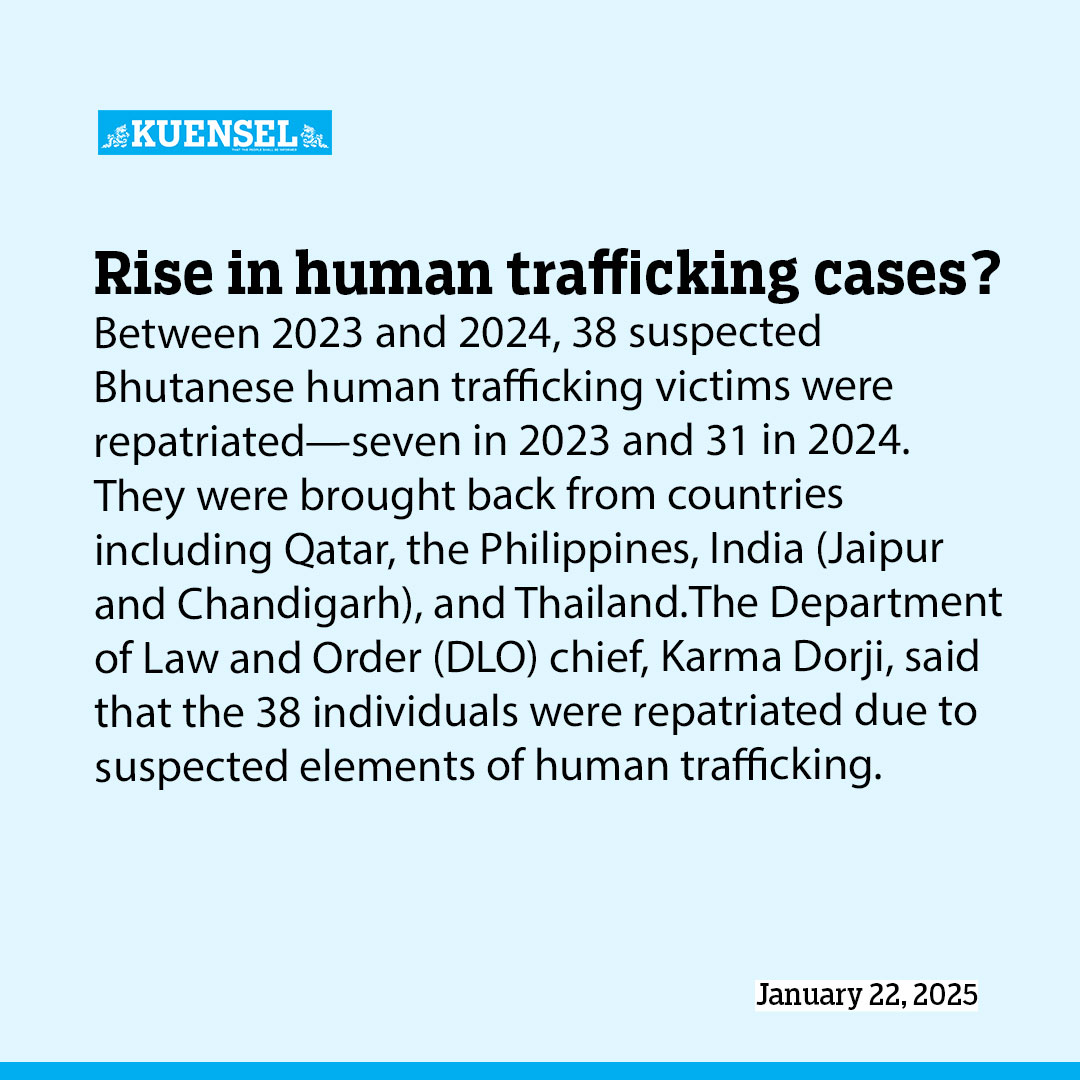Sherab Lhamo
Between 2023 and 2024, 38 suspected Bhutanese human trafficking victims were repatriated—seven in 2023 and 31 in 2024. They were brought back from countries including Qatar, the Philippines, India (Jaipur and Chandigarh), and Thailand.
The Department of Law and Order (DLO) chief, Karma Dorji, said that the 38 individuals were repatriated due to suspected elements of human trafficking. These included recruitment by unlicensed agents, forced labour with excessively long hours, lower-than-promised wages, passport confiscation, restricted movement, and threats of financial penalties for leaving their houses.
“These threats often involved demands for reimbursement of visa processing and travel expenses,” he said.
Of the 38 individuals, four were males and 34 were females.
DLO data shows that 42 percent were women, 18 percent were girls, 23 percent were men, and 17 percent were boys.
Karma Dorji said that 24 of the 38 individuals were repatriated from the Middle East after seeking assistance from the Royal Bhutanese Embassy in Kuwait. Six individuals were identified by law enforcement in the Philippines, one was located in Jaipur by Indian police, and six domestic workers were found in Bangkok, Thailand, having been recruited by an unlicensed monk in Bhutan. In Chandigarh, an individual had travelled to meet someone she met through TikTok. Karma Dorji noted that this case might not qualify as illegal recruitment, as the travel was voluntary.
“We are not sure if that boyfriend of hers is her lover or someone trying to traffic her,” he said, adding that the individual’s whereabouts remains unknown.
He said that the recruitment was primarily for sexual and forced labour exploitation, with women being targeted more frequently than men.
Karma Dorji said that criteria for overseas employment by the Department of Employment and Entrepreneurship (DoEE)—such as a minimum education level of Class 10, an age limit of 21 to 29 years, and restrictions on sectors like domestic work, massage parlors, and construction—may be pushing individuals toward illegal agents.
He cited instances where individuals lured by promises of Nu 30,000 for domestic work abroad ended up earning only Nu 26,000, despite working long hours without benefits such as annual or medical leave. These conditions, coupled with significant risks of exploitation and potential sexual abuse, make such overseas employment far more dangerous compared to domestic work in Bhutan, where wages are around Nu 15,000 and the risks are lower.
A study by the DLO found that social stigma surrounding domestic work in the country might be a key factor driving individuals to seek employment abroad through illegal channels.
Victims shared that their desperation to find a “decent job” left them with little choice.
“The risks associated with domestic workers are very high,” Karma Dorji said, adding that many of the repatriated individuals were linked to unlicensed agents operating within Bhutan.
DLO is currently investigating these cases.
Karma Dorji said that if these illegal agents are convicted, they could face a fourth-degree felony charge, carrying a prison sentence of three to five years.
He said that victims should understand that consenting to an agent’s services does not give the agent the right to exploit them, even if they have signed an agreement.
“This is a common misconception among people,” he said.
On January 14, 2025, DLO in collaboration with the DoEE, organised a day-long workshop for law enforcement officers stationed at Integrated Check Posts (ICPs) and border check gates. The workshop focused on preventing human trafficking by closely monitoring the movement of potential victims across land borders.
Similar workshops were conducted for officials from immigration, customs, the regional office of industry, commerce, and employment, Phuntsholing ICPs, and two airline companies, including their ticketing counters. The goal of the workshop was to equip them with the skills to identify potential human trafficking victims and recognise red flags.
Karma Dorji said that the training enabled authorities to identify 26 victims attempting to leave the country. These individuals were reintegrated through procedures facilitated by DoEE.
The DLO is currently developing a standard operating procedure (SOP) for victim identification at entry and exit points to institutionalise the process.
Karma Dorji said that the government spent about a million ngultrums to repatriate the victims.


